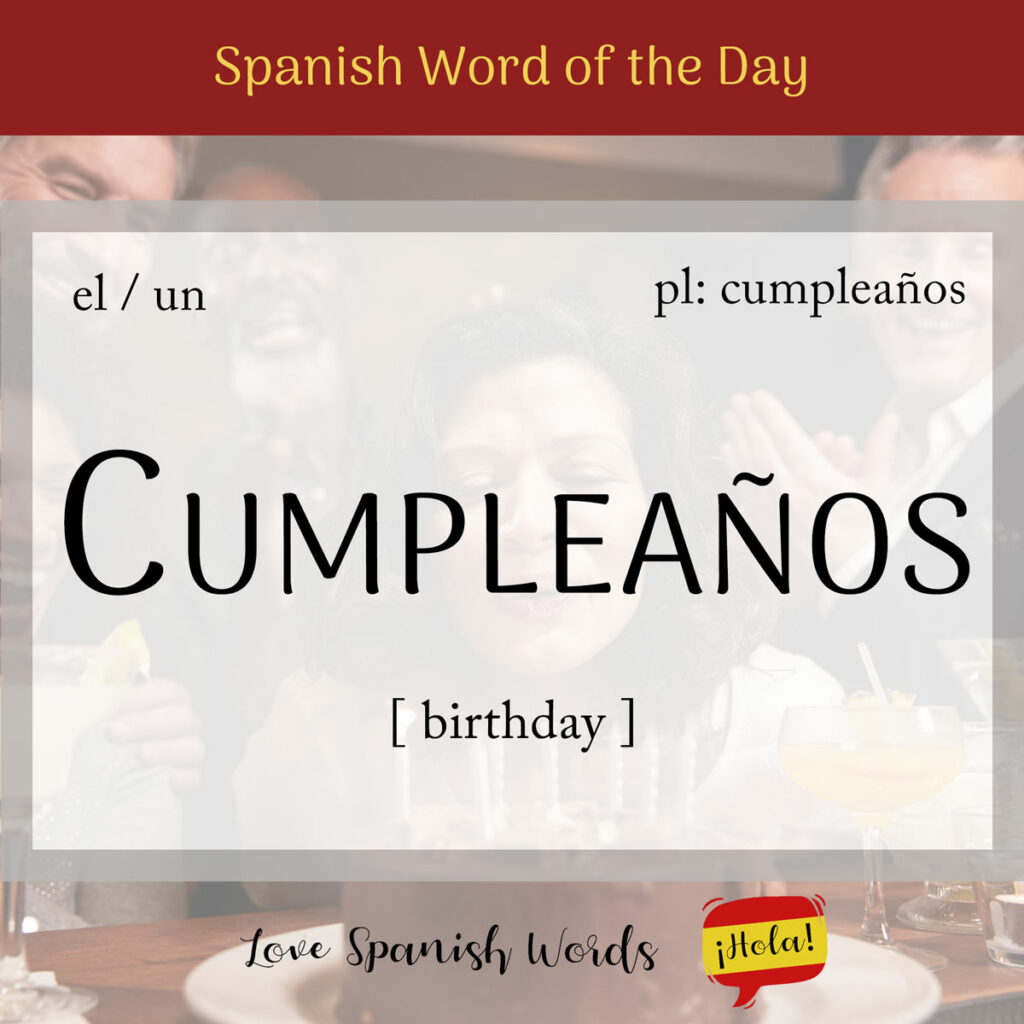I have been thinking about how to celebrate my husband’s cumpleaños (birthday) and that got me thinking about the origin of this word. Cumpleaños is a compound word derived from the Spanish verbs cumplir (to fulfill or complete), which comes from the Latin word complere, meaning to fill up or complete; and años (years), coming from the Latin word annus, meaning year. Together it literally means to complete years, signifying the completion of another year of life.
Latin American Pronunciation
European Pronunciation

Cumpleaños is an invariable masculine noun that takes the following definite and indefinite articles:
- el cumpleaños = the birthday
- un cumpleaños = a birthday
- los cumpleaños = the birthdays
- unos cumpleaños = some birthdays
Some common phrases with the word cumpleaños include:
- Feliz cumpleaños = Happy birthday
- celebrar el cumpleaños = to celebrate the birthday
- cumpleañero/cumpleañera = birthday boy/girl
- tarjeta de cumpleaños = birthday card
- Fiesta de cumpleaños = birthday party
¡Qué linda está la cumpleañera!
The birthday girl looks so cute!
There are several verbs associated with cumpleaños. Like I mentioned before, the verb cumplir (to fulfill or complete) is commonly used to talk about turning a certain age. For example, you can say: mañana cumplo 25 años (tomorrow I turn 25 years old). Other useful verbs are:
- celebrar = to celebrate
- regalar = to give a gift
- festejar = to celebrate or throw a party
- desear = to wish
¡Te deseo un feliz cumpleaños!
I wish you a happy birthday!
Cumpleaños are celebrated with various traditions that often reflect the culture and customs of the specific country. For instance, in countries like Mexico and Colombia, after the birthday cake is presented, the birthday person is often encouraged (or playfully forced) to take the first bite directly from the cake, known as la mordida (the bite). Friends and family may push the birthday person’s face into the cake as a fun prank.
Music is an essential part of the cumpleaños celebration. The most popular song is Cumpleaños Feliz (Happy Birthday), similar to the English version. It’s sung with a distinctive rhythm and melody and you must count the numbers at the end up to the age of the cumpleañero/a (birthday person). Another popular song and beloved part of Mexican birthday celebrations is Las Mañanitas (the mornings), usually sung early in the morning or before cutting the pastel/torta (cake).

Quinceañera:
The 15th birthday, especially for girls, is a significant event known as quinceañera. It marks the transition from childhood to womanhood and is celebrated with a lavish party, including a religious ceremony, a formal dance, and symbolic rituals like the ‘changing of the shoes’ from flats to high heels. Quinceañeras are celebrated not only in Mexico but throughout Latin America.
Two other fun traditions are the piñata and La Tirada de Orejas (The Ear Pulling):
- Piñatas are often filled with candies and small toys, and while the blindfolded cumpleañero/a takes turns trying to break it open with a stick, others sing a traditional song.
- In some regions of Spain, La Tirada de Orejas is customary, or the act of pulling the birthday person’s ears gently—once for each year of their age. This is done as a playful gesture wishing them well.
¡Es hora de romper la piñata!
It’s time to break the piñata!

Fun fact:
If you are into astrology, the signos zodiacales (zodiac signs) have pretty similar names in Spanish:
- Aries = Aries
- Tauro = Taurus
- Géminis = Gemini
- Cáncer = Cancer
- Leo = Leo
- Virgo = Virgo
- Libra = Libra
- Escorpio = Scorpio
- Sagitario = Sagittarius
- Capricornio = Capricorn
- Acuario = Aquarius

Spanish idioms featuring ‘cumpleaños’
¡Que los cumplas feliz!
Literal translation: May you celebrate them happily!
English meaning: To wish someone a happy birthday celebration
Llegar al cuarto de siglo
Literal translation: to reach a quarter of a century
English meaning: a playful way to say someone is turning 25 years old.
Estar de cumpleaños
Literal translation: to be on one’s birthday
English meaning: It indicates that today is someone’s birthday.


